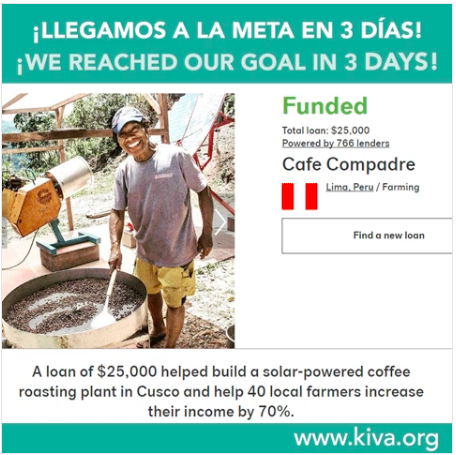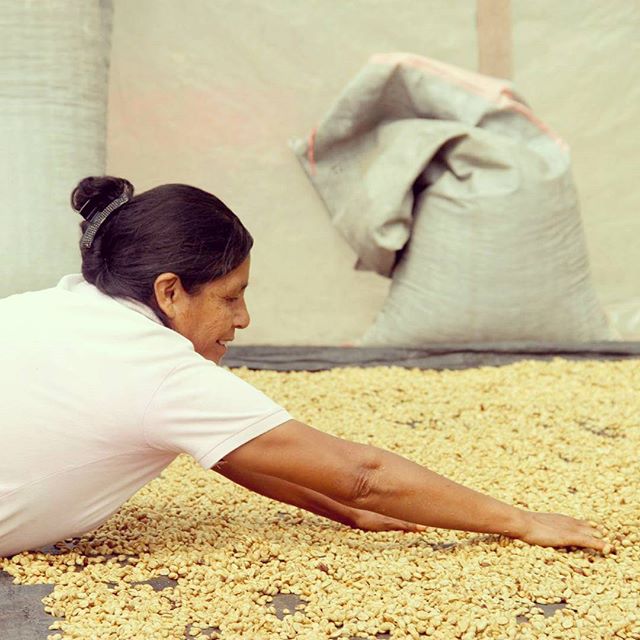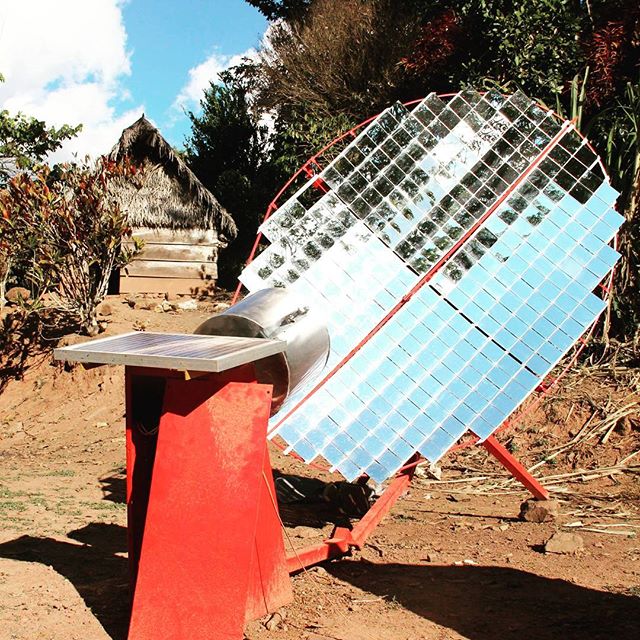Cafe Compadre's $25,000 loan was funded in under 72 hours! Thanks to the 766 Kiva lenders for becoming part of Compadre's mission to improve incomes for coffee farmers through solar tech.
The Coffee Industry
Buying and selling green coffee beans in bulk from small-scale farmers is the norm. Small-scale coffee farmers are not only unable to access the added value of their product, but they’re also unable to consider how they can improve the quality of their coffee from start to end of the supply chain because they’re cut out from the process.
The only way to access increased income is through greater production of the product. This creates a vicious cycle where their low pay, increased coffee production (of a product that may not be at its highest potential), and environmental strain perpetuate poverty.
Cafe Compadre reverses this cycle by helping the farmers produce better quality coffee to generate higher income for their families. Through the feedback and training provided by Compadre, farmers can focus on quality over quantity and improve their livelihoods.
The Team
Over the past 20 years, NESsT has trained 14,000 entrepreneurs in over 55 countries and we’ve learned that what propels a great concept forward is the person.
The founders, Juan Pablo, Pepe, Fiorella, and Francois have diverse backgrounds and experiences living with communities in the jungle area. They met as part of the Rural Sector Support Group at their university where they were applying their education to develop machinery and improve the lives of communities in the jungle and highlands of Peru.
This is a diverse team: Juan Pablo and Pepe are mechanical engineers, Fiorella is a sociologist and the fourth co-founder, François, is an alternative energy engineer. By joining the NESsT portfolio, Compadre has been able to expand their sales strategy, develop a financial management system, and strengthen its governance structure and operations.
The team continues to be involved in the Rural Sector Support Group applying their engineering and design skills to further achieve community goals in areas outside of coffee production, such as designing more versatile classrooms for small kids and supporting classmates in using solar energy to dry tea.
While working at the research facilities in Cusco, they got to know the coffee farmers in the area (additional to the communities in Satipo, Junin). When demand for their coffee increased, they started sourcing from Cusco. Now, local coffee farmers are asking to work with Compadre consistently.
This is a sincere and dedicated team that truly cares about the objectives that they’re pursuing. It shows in the way they share their knowledge on organic and responsible farming to promote care of the jungle.
Impact on Communities
Building relationships based on respect and trust is at the core of expanding livelihood opportunities for diverse communities.
As an early adopter of the solar-powered coffee roaster provided by Café Compadre, Cristóbal became a role model for other coffee farmers. Based on this relationship, Café Compadre has been able to incorporate other farmers who know Cristóbal into the enterprise’s supply chain.
Meeting Cristóbal proved fundamental as it led to the adaptation of the technology and business model to meet the real needs of coffee farmers, and ultimately to market demand. Through Cristobal, 10 additional farmers were trained in roasting coffee. Compadre trains farmers on details such as the right heating curve at which to roast their coffee.
Certified testers approve the coffee that will be sold by Compadre, and those that are not approved are given feedback on how to improve their coffee to be able to access higher income.
Marcelina was the third person to match the requirements and practices.
Upgrading the Coffee Plant
Cafe Compadre has garnered the support of tech company Autodesk who has provided access to free software to upgrade their solar-powered coffee roaster. The current model involves smaller roasters. By upgrading their model, they will be able to scale their production 5X (from 5 tons to 25 per year).
At first the idea was to sell the solar roaster, but it was more costly for each farmer. The uncertainty of each season’s productions made it a risky investment for them and so the solar-powered roasters were stationed on their land for any coffee farmer to be able to roast their coffee beans. Cristóbal has a contract with Compadre for the solar-powered roaster to be positioned on his land because he wants to enable this opportunity for as many colleagues as possible.
Follow their movement to use clean energy to improve livelihoods and fight environmental pollution.
Follow on Instagram: @cafe.compadre






